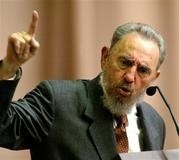Some say they're not sure much will change in the country. One man predicts that any change will have to come from the within the military. He calls Castro ``the leader of the gang'' but says the rest of his group doesn't ``want to see change.''
Another jokes that it's likely to start more rumors that Castro has died. Such rumors are common in the Cuban exile community.
While Castro may be resigning -- he probably isn't going away.
Castro remains a member of the Cuban parliament and is likely to be elected to the 31-member Council of State on Sunday, though he will no longer be its president.
The 81-year-old leader announced in a letter posted online early today that he will not accept a new term as president. He said that he wanted to continue carrying out his duties to his ``last breath'' but he's no longer up to it physically.
Castro hasn't appeared in public since handing power to his brother Raul and undergoing intestinal surgery in July 2006. The only images of him have been official photographs and videotapes. He's also published some essays.
Castro has been Cuba's unchallenged leader since 1959. Monarchs excepted, he is the world's longest ruling head of state.
President Bush is hoping the end of Castro's presidency will launch a transition to democracy in Cuba. While Bush is hopeful for significant change, he says Cuba's ``human condition will remain pathetic'' in the meantime. He says the U.S will help the Cuban people ``realize the blessings of liberty.''
CASTRO'S BACKGROUND, RISE TO POWER
Castro rose to power on New Year's Day 1959 and reshaped Cuba into a communist state 90 miles from U.S. shores. The fiery guerrilla leader survived assassination attempts, a CIA-backed invasion and a missile crisis that brought the world to the brink of nuclear war. Ten U.S. administrations tried to topple him, most famously in the disastrous Bay of Pigs invasion of 1961.
His ironclad rule ensured Cuba remained communist long after the breakup of the Soviet Union and the collapse of communism across Eastern Europe.
Monarchs excepted, Castro was the world's longest ruling head of state.
"The adversary to be defeated is extremely strong," Castro wrote Tuesday, referring to the United States. "However, we have been able to keep it at bay for half a century."
Raul Castro had long been his brother's designated successor. The longtime defense minister had been in his brother's rebel movements since 1953 and spent decades as No. 2 in Cuba's power structure.
The United States, bent on ensuring neither brother is in power, built a detailed plan in 2005 for American assistance to ensure a democratic transition on the island of 11.2 million people after Fidel Castro's death. But Cuban officials insisted there would be no transition, saying the island's socialist political and economic systems would outlive Castro.
Castro's supporters admired his ability to provide a high level of health care and education for citizens while remaining fully independent of the United States. His detractors called him a dictator whose totalitarian government systematically denied individual freedoms and civil liberties such as speech, movement and assembly.
The United States was the first country to recognize Castro after his guerrilla movement drove out then-President Fulgencio Batista in 1959. But the two countries soon clashed over Castro's increasingly radical path. Castro seized American property and businesses and invited Soviet aid.
On April 16, 1961, Castro declared his revolution to be socialist. A day later, he defeated the CIA-backed Bay of Pigs invasion.
The United States squeezed Cuba's economy and the CIA plotted to kill Castro. Undaunted, the Cuban president supplied troops and support to revolutionaries in Africa and Latin America.
Hostility over Cuba reached its peak on Oct. 22, 1962, when President Kennedy announced there were Soviet nuclear missiles in Cuba. After a tense week of diplomacy, Soviet Premier Nikita S. Krushchev pulled out the weapons.
With the end of the Cold War in the early 1990s, Castro eventually made peace with many governments that once shunned him. Pope John Paul II visited the island in January 1998.
The loss of Soviet aid plunged Cuba into financial crisis, but the economy slowly recovered in the late 1990s with a tourism boom.
Castro later reasserted control over the economy, stifling the limited free enterprise tolerated during more difficult times.
Fidel Castro Ruz was born in eastern Cuba, where his Spanish immigrant father ran a prosperous plantation. His official birthday is Aug. 13, 1926, although some say he was born a year later.
He attended Roman Catholic schools and the University of Havana, where he received law and social science degrees.
Castro launched his revolutionary battle as a young man, organizing an unsuccessful July 26, 1953 attack on a military barracks in the eastern city of Santiago.
Later freed under a pardon, Castro went to Mexico and organized a rebel army that returned to Cuba and rallied support in the Sierra Maestra mountains. His rebels took power when Batista was forced to flee.
Entering Havana triumphantly, Castro declared: "Power does not interest me, and I will not take it."

Fidel Castro
http://accesswdun.com/article/2008/2/207121
